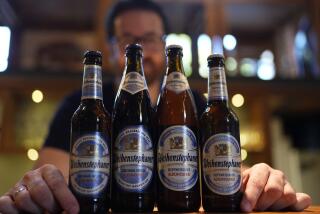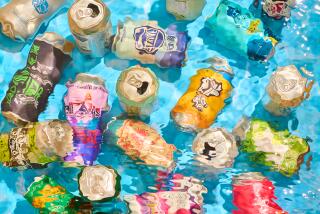West Germans in a Froth Over ‘Purity of Beer’ Ruling Due From European Court
- Share via
BONN — West German brewers are in something of a froth over a ruling that the European Court of Justice in Luxembourg is expected to hand down sometime this year.
Sources close to the court say it is likely to strike down a “purity of beer” law that has been the pride of German brewmasters for nearly 500 years.
For the record:
12:00 a.m. Dec. 3, 1986 For the Record
Los Angeles Times Wednesday December 3, 1986 Home Edition Part 1 Page 2 Column 1 Foreign Desk 2 inches; 39 words Type of Material: Correction
An article in the Nov. 1 issue of The Times stated erroneously that Beck’s beer sent abroad contains additives. The brewery in Bremen points out that Beck’s export beer contains no additives and is the same beer that is marketed domestically under West Germany’s pure-beer law.
Such a ruling could open the German market to imported beers, notably from other countries in the European Common Market. It could even enable the Americans to get a foot in the door.
“We will be looking carefully at the opportunity,” said a London spokesman for Anheuser-Busch of St. Louis, brewers of Budweiser and Michelob.
The German law that inhibits the importation of foreign beers has its roots in an order issued by Duke Wilhelm of Bavaria in 1516 that beer was to contain nothing but malted cereals, hops and water. Years later, natural yeast was included.
Religiously Enforced
The law has been religiously enforced on beers sold to the domestic market. Those who break it are arrested and punished. Only last spring, one Helmut Kieninger was arrested for adding chemicals to beer. He committed suicide in a Munich jail.
In pressing their case before the court in Luxembourg, German government and brewery officials have argued that additives are “adulterants” and could be harmful to the beer drinkers of Germany.
Yet around the world, from Milwaukee to Tokyo, most beer is made with one or more chemical additives--preservatives and stabilizers that ensure a frothy head and a longer shelf life.
The German purity law, the Reinheitsgebot, protects an industry in which there are few national brands. Instead, more than 1,200 breweries turn out beer under about 4,000 labels and local products dominate their regions.
Seen as Trade Barrier
To the brewers of other European countries, the German law is simply a non-tariff barrier to their beer. French brewers in Alsace, for example, once complained that their beer had been turned back at the German border on grounds that it was “impure.”
It was complaints like this that caused the Commission of the European Communities, in 1984, to initiate the action that is before the Court of Justice. The commission contends that the German law violates Common Market regulations against protectionism and the free movement of goods among member countries.
This view was upheld recently by the court’s advocate general, Gordon Slynn, a Briton, who argued that the additives in European beer are not harmful. According to sources in Luxembourg, Slynn’s view will probably be accepted by the court, for Common Market rules hold in general that if a product is deemed safe by one member country it should be considered safe by the others.
Additives in Exports
Further, as European brewers point out, German beers that are exported--among them Lowenbrau of Munich and Beck’s of Hamburg--contain additives so that they will fare better abroad. Of total German beer production, 5.4% is exported.
The court’s ruling is expected to give a boost especially to brewers in the countries that border West Germany--France, Belgium, the Netherlands and Denmark. Successful, competitive beers are produced in all these countries.
In terms of per capita consumption, the German market is the largest in Europe. The average German drinks 146 quarts of beer a year, and the figure rises to 230 for Bavarians. The average Frenchman, by contrast, drinks only 45 quarts of beer a year. Americans consumed about 95 quarts per capita last year, according to Impact, a newsletter about the U.S. alcoholic beverage industry.
The spokesman for Anheuser-Busch in London said that his firm has test-marketed a beer without additives called Bud in Germany. Using the Budweiser label, however, would make for a legal problem because the Czechoslovaks insist on exclusive use of that word for one of their beers, he said.
According to the Anheuser-Busch official, it makes little sense to try to sell a beer in Germany, or anywhere else, that is not the same as the beer produced for consumption at home in the United States.
“We have found that we needed to sell an authentic American product to be successful,” he said.
Purity, Quality
West Germans argue that the purity law has accounted for the best beer in the world. In defense of the law, German researchers note that beer constitutes as much as 26% of the daily food intake of the average German male.
Franz Josef Strauss, the state premier of Bavaria, has characterized the purity law as “one of the oldest and best food laws in the world.” And an automobile executive in Bavaria said not long ago, as he offered a beer to a visitor, “We look upon beer as nourishment, to be taken any time of the day, even in the morning.”
Some brewers worry that the threat of foreign competition will cause a number of Germany’s small, marginal breweries either to shut down or be absorbed by larger breweries.
But others feel confident that German beer drinking habits are so ingrained that it will be difficult for foreign brands to crack the market.
“We don’t think the Luxembourg decision is going to have any great effect on our market,” a brewery spokesman said in Bonn. “People who favor pils aren’t going to change to Guinness.”
Pilsener at Top
Pils, or pilsener, which takes its name from the Czech city where it was first made, is the most popular beer in Germany. It is a light beer, which forms a creamy head, and it has an alcoholic content of about 4%.
Kolsch, another type of light beer, is also popular. And there is export, a full-bodied beer; bock, a strong, dark beer; alt, or old, beer, which is heavy on hops; weizenbier, which is made from wheat rather than barley malt; and Berliner weisse, which contains only 2.5% alcohol.
Germans like to see their beer drawn very carefully, with three to four “layerings.” A stein of beer may take as long as 10 minutes to prepare before it is considered ready to serve.
Americans, on the other hand, are accustomed to ordering a cold beer and having it served up in a jiffy. They down it almost as quickly, and they can get impatient waiting.
“Germany produces a great beer,” an American serviceman said the other day, “but you could die of thirst waiting for it.”
At some beer stubes, or taverns, the process is speeded up by having waiters moving about with large trays of steins filled and at the ready.
As the time draws near for the court in Luxembourg to hand down its ruling, brewers here and abroad grow increasingly attentive. But few German beer drinkers look for any personal impact. A regular at one of Bonn’s drinking places sipped his kolsch the other evening and observed: “It makes no difference to me. I’ll never drink anything but pure German beer. I wouldn’t spend a penny on any of that foreign chemical stuff.”
More to Read
Sign up for Essential California
The most important California stories and recommendations in your inbox every morning.
You may occasionally receive promotional content from the Los Angeles Times.













